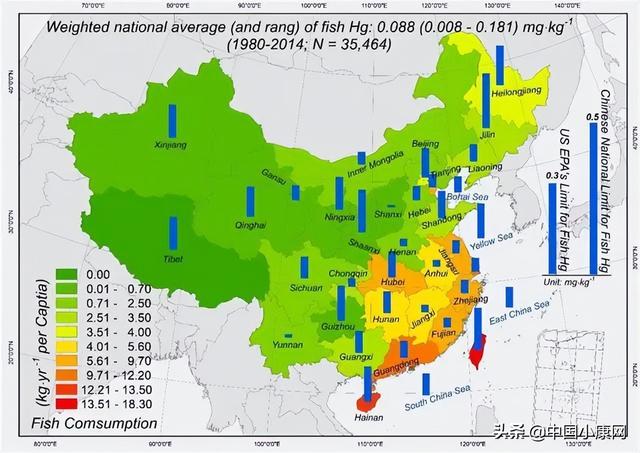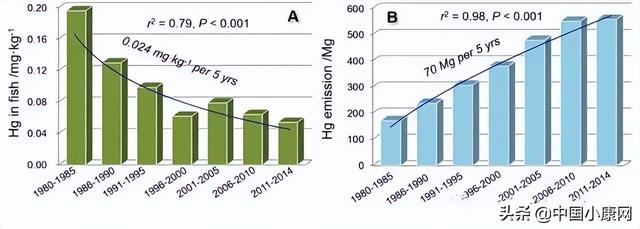"Perspective Club · Ecological Supervision" eat fish, will you worry about mercury pollution?
Author:China Well -off Time:2022.07.01
In recent years, with the development of the industrial economy, the discharge of waste discharge has intensified, causing severe pollution of heavy metals such as soil and waters. The most typical of which is "mercury". Methyl mercury is one of the most toxic mercury compounds, and can be transmitted step by step from low -nutritional aquatic creatures to high -nutritional aquatic creatures through the food chain. The Japanese "water pheasant disease" incident that shocked the world was methyl mercury poisoning caused by water pollution.
Japan "Water Disease" incident
In 1956, many residents in Shuiwanwan, Japan, had a strange disease. The patients were unclear, faltering, paralyzed hands and feet, and nerve disorders until they died. After investigation, the culprit is the mercury emitted by the local chemical factory to the ocean. These mercury is enriched in the fish and is eaten and absorbed by the locals, which eventually causes disease. This disease is named after the name of the occurrence and is called hydrophilic disease. To this day, hydrophilic disease has been recognized as one of the most important environmental pollution disasters in the world.
If the fish lives in the environment of mercury pollution, it will naturally become a rich place for metal mercury. So, in our country, what level of mercury content in the fish is at?
From the perspective of overall data, the content of fish and mercury in my country is generally lower than domestic and international standards, so the health risks of fish eating in my country are not high. In a latest study, in the past 30 years, the mercury content of fish in my country has declined significantly.

From 1980 to 2014, the total mercury concentration of Chinese fish (MG/KG; blue column map) and regional per capita fish consumption (represented by different background color) space distribution sources: "Eco-Evalonment & Health) "Magazine
The research data of the scientific researchers systematically summarized the publicly published research data from foreign authoritative experts found that Western developed countries are the main contributors to the world's people for atmospheric mercury emissions. It is estimated that from the 100 years from the industrial revolution in 1850 to 1950, the a total of more than 200,000 tons of atmospheric mercury emissions in Western developed countries and regions was as high as more than 200,000 tons. From 164 from 1850 to 2014, the global atmospheric mercury emissions reached 352,000 tons, while in my country only about 16,000 tons (and most of them were discharged after reform and opening up), less than 6%of global emissions. The contribution of emissions in Europe exceeds 50%of global emissions.
在上述背景下,研究人员利用数据荟萃分析的研究方法,通过系统收集1980年-2014年期间共计35464个鱼类样本数据,包括采样年份、研究地点、鱼类类型、鱼类种群/样本数量、 Comprehensive information such as fish mercury content and feeding habits, the national database of Chinese marine fish and freshwater fish concentration has been established. Base.

From 1980 to 2014, the time diagram of the time changes of mercury emissions caused by Chinese fish mercury content and human activity. (A) The weighted average of the total mercury content in Chinese fish samples (mg/kg; wet weight);
Studies have shown that in the 30 years from 1980 to 2014, the amount of atmospheric mercury emissions in my country continued to increase year by year, and the mercury content of fish was significantly declining. From 0.196 mg/kg in 1980 to 0.054 mg/kg in 2014, it decreased by more than 70%. On average, the mercury content in the fish body was reduced by 0.024 mg/kg every five years.
After the system analysis, the researchers believed that this was mainly related to the sharp increase in excessive fishing and consumer demand that caused the growth cycle of marine fish and freshwater fish, and the decline in food chain nutrition and rapid fish growth. The research results reveal the complex and profound influence of the social system on the natural system, and the coupling study of the two has important enlightenment for the performance of the International Military Cases.
"The issue of mercury pollution prevention is extremely complicated and controversial global environmental hot topics." The first author of the thesis of the research project and researcher Zhang Hua, the Institute of Geomics of the Chinese Academy of Sciences, said that as my country vigorously promote the construction of ecological civilization, excessive fishing can be caught. Strictly curb, further restore the balance of ecosystems. In the future, Chinese fish mercury content may increase with factors such as food chain nutritional levels and growth cycle. Find a new balance between management and control needs to avoid the challenges faced by developed countries such as Europe and the United States during the prevention and control of mercury pollution.
The result was research on the research staff of scientific researchers from domestic and foreign scientific research institutions such as the Institute of Geochemistry of the Chinese Academy of Sciences, the City University of Hong Kong, the Ecological Environment Research Center of the Chinese Academy of Sciences, the Chinese University of Geosciences (Wuhan), the University of Ramar, the University of Lamart, and the Norwegian Research Institute. Recently published in the international English journal "Eco-Evalonment & Health" (EEH).
Perspective Society Comprehensive China Environmental Network and Journal "Eco-Evalonment & Health" report
Edit: Cheng Yi
School pair: Wu Yueran
Review: Gong Zimo
- END -
Pu'er: Ban Mountain Hotel is helpful for cultural tourism integration

Mansi Hotel is a boutique hotel + tourist destination that fully demonstrates the ...
The prominent problem of public security and public security of Jinan City carried out the comprehensive governance of "governing chaos and clearing the source"

Qilu.com · Lightning News, July 6th, at 19:00 on July 5th, under the organization...